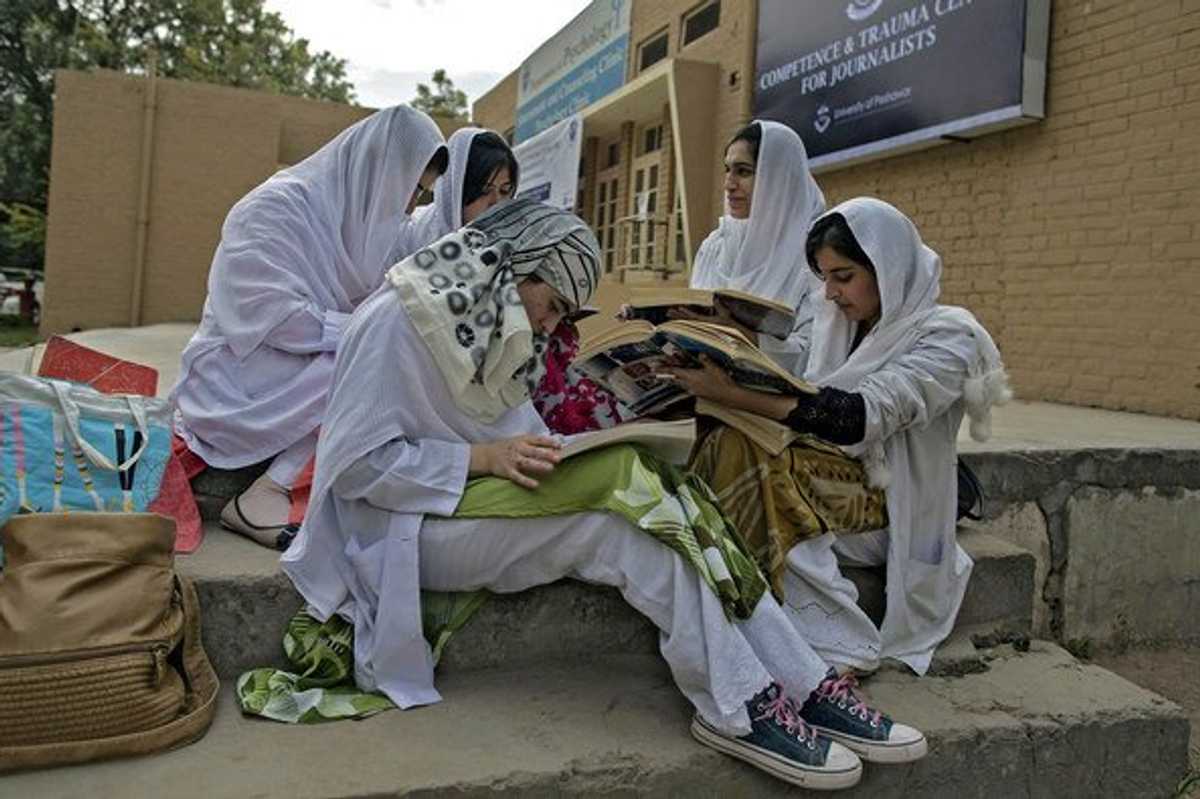Pakistan regulator cracks down on 14 private medical colleges over fee violations
PMDC accuses colleges of overcharging students beyond legal fee cap; court halts punitive action for now
Huzaifa Rathore

Psychology students study outside the Competence and Trauma Centre for Journalists inside a university's psychology department in Peshawar on Nov. 24, 2014.
Reuters/File
The Pakistan Medical and Dental Council (PMDC) has issued show-cause notices to 14 private medical and dental colleges across the country for allegedly charging students above the authorized annual tuition fee limit.
Under PMDC regulations, private colleges cannot charge more than PKR 1.8 million annually in tuition fees. However, reports suggest several institutions have been collecting additional charges under different categories, significantly exceeding the approved cap.
The dispute over tuition fees has persisted since early 2024, when PMDC reminded all recognized colleges of their legal obligations under Section 20 (7) and (8) of the PMDC Act, 2022. In a letter dated January 29, 2024, the council directed colleges to publicly announce their fixed fees, avoid mid-program increases, and submit financial justifications for their annual fee plans.
Despite these instructions, many institutions reportedly continued to raise fees without PMDC’s approval, prompting widespread complaints from parents and students.
While PMDC has not publicly identified the colleges, sources told Nukta that Abwa Medical College (Khurrianwala, Faisalabad), Abu Umara Medical & Dental College (Lahore), and Aziz Fatimah Medical & Dental College (Faisalabad) are among those under investigation for alleged violations.
The controversy gained momentum after the Senate Standing Committee on Health’s subcommittee, led by Senator Palwasha Muhammad Zai Khan, released its 2024–2025 report. The committee reached out to all 121 private colleges, though only those in Islamabad responded.
Initially, the committee proposed setting the annual fee cap at PKR 1.2 million but later agreed on PKR 1.8 million as a compromise between affordability for students and financial stability for institutions. It also urged PMDC to take strict action within a week against colleges breaching the limit and to ensure students are reimbursed.
The committee allowed only a few exceptional institutions – those with advanced facilities – to charge higher fees, provided they secured PMDC approval with full financial justification.
Acting on recommendations from the Prime Minister’s Committee on Medical Education Reforms, chaired by Deputy Prime Minister Ishaq Dar, PMDC issued a formal notification on April 28, 2025, capping annual MBBS and BDS tuition at PKR 1.8 million.
The notification permitted a 5% increase for the 2025 session and biannual adjustments based on the Consumer Price Index (CPI) from 2026 onward. Colleges that had already charged beyond the limit were instructed to refund or adjust the excess in subsequent sessions. According to sources, none have complied so far.
PMDC has warned that non-compliant colleges could face fines, suspension, or deregistration. Complaints can now be filed directly through the PMDC Complaint Portal.
When approached for comment, a PMDC spokesperson declined, saying the matter is sub judice before the Islamabad High Court (IHC).
The Pakistan Association of Private Medical and Dental Institutions (PAMI) has appealed to the prime minister, deputy prime minister, army chief, and health minister to intervene and prevent the closure of private colleges.
A PAMI official confirmed that the association has filed a petition in the IHC challenging the October 16, 2025, show-cause notices, calling them unlawful under the PMDC Act, 2022.
During the hearing, PAMI’s counsel argued that the Act does not grant PMDC authority to fix or cap tuition fees. Section 9, the counsel said, does not empower the council to regulate fees, while Section 20 allows private institutions to set their own tuition annually.
The court has restrained PMDC from taking any coercive action against the petitioners until the case is decided.
For students and their families, the issue extends beyond numbers. It is about fairness and opportunity. As the legal battle unfolds, many fear the true cost of education in Pakistan may be measured not just in rupees – but in lost potential.







Comments
See what people are discussing